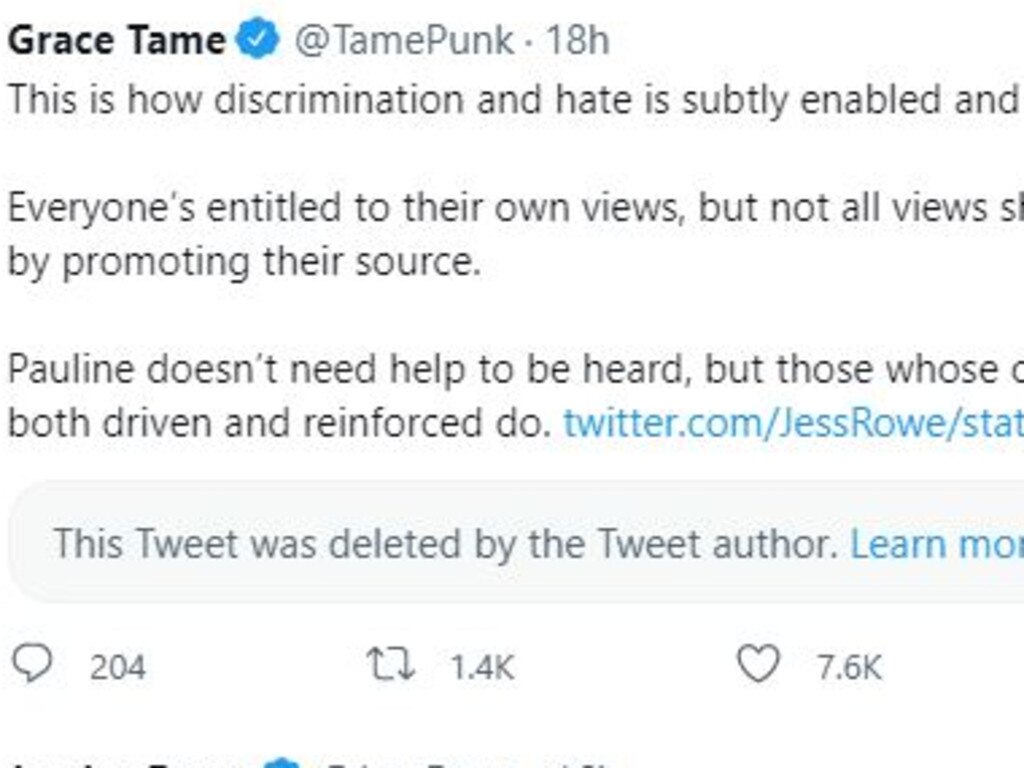
Last week, young women put a virtual scold’s bridle on senator Pauline Hanson when they publicly shamed podcaster Jessica Rowe into censoring an interview with her. Every time the Twitter pack scalps a heretic, it is one step forward for tyranny and a big step backward for humanity. On social media, activists took it on themselves to accuse Rowe of discrimination, hatred and dehumanisation for speaking to another woman about life, love and raising a family. Rowe’s crime was to reach across the political divide and talk to another woman despite their differing world views.

By doing so, she unwittingly violated social justice norms. She sought to understand before being understood. She treated the person before her as a human being rather than reducing her to a political caricature. And she showed by example that what unites Australians in family and friendship is more important than what divides us in politics. It was a mature message for an immature audience.
After the Twits set their sights on Rowe, she asked Southern Cross Austereo to delete the interview. Speaking to The Australian’s Sophie Elsworth, SCA chief Dave Cameron portrayed the decision to censor Hanson as an act of compassion: “We are really supportive of Jess … We certainly weren’t going to push her into a situation where she was going to be made to feel more uncomfortable.”
The censorship of the Rowe-Hanson interview is a victory for the rigid left and sends a dangerous message to young people that gagging women you find offensive is OK. What struck me about this example of suppressing women was the psychological attack on Rowe that preceded it. It is well known that she has a history of depression and anxiety. She has spoken on many occasions about her struggle and she was appointed a member of the Order of Australia for mental health advocacy.
None of it mattered when she inadvertently fell foul of mob authority online. After seeing news of Hanson’s podcast on Twitter, the malign order of the finger-jabbers came out in force. Rowe stood accused of that heinous crime, fraternising with the enemy. Freedom of association be damned when the Twits are on the march. In some posts, 20-somethings with limited media experience gave 51-year-old Rowe unsolicited advice on how do her job.
Grace Tame led the important struggle to change a Tasmanian law that prevented victims of sexual abuse from speaking about their experience. Tame was selected Australian of the Year for her courageous work and she earned it. However, she has not earned the right to accuse a seasoned media star of enabling discrimination for speaking to a democratically elected senator. Nor has she earned the right to propose the silencing of a woman with whom she disagrees. After Rowe tweeted about her upcoming talk with Hanson, Tame responded: “This is how discrimination and hate is (sic) subtly enabled … Pauline doesn’t need to be heard.”
Yes, she does. Recall that Tame was the face of the #LetHerSpeak campaign. Define “Her”. Isn’t Hanson a woman too? Doesn’t she have the right to be heard?
In a separate critical post, podcaster Nakkiah Lui accused Rowe of “platforming a racist” and claimed that when interviewing someone with Hanson’s beliefs, “if you’re not interrogating them, you’re validating” their opinions.
For women who strive to be journalists rather than grand dames of the inquisition, developing the skill to ask a considered question is important. Interrogation is a different skill usually reserved for more aggressive lines of inquiry. And it can be the preferred discursive style of those who see enemies in the presence of mere dissent and approach an argument armed with predetermined conclusions that reason cannot budge.
The great sadness of the Rowe affair was her unwillingness to persist with the podcast. She might have defended her decision to interview Hanson on the simple grounds that democracy works only when people speak to each other, especially when they strongly disagree. She might have said when your knee-jerk reaction is to silence the people with whom you disagree, and you act on that instinct without remorse, you undermine democracy. She might have offered the chance for people to meet with Hanson and learn to argue the case, not the woman.
Instead, Rowe followed the path of many celebrities in the face of a social media backlash: she apologised for her alleged offence, agreed to withdraw the offending material and distanced herself from the target of the Twitter witch-purge: “Pauline’s political views are the opposite of mine. I have never agreed with her … Kindness is at the heart of who I am.”
There are many schools of feminism and they differ so greatly that women often lead opposing teams in arguments about women’s rights. At international forums such as the UN, basic legal rights for women and girls are subjected to dissent from activists who earnestly believe religious beliefs trump basic human equality. But I have never come across a modern movement that claims to support feminist principles while silencing a woman who dissents from the majority view.
Censoring Hanson was not an act of compassion. It was an act of ostracism.







The scold’s bridle was a historical device used to silence people deemed offensive, including women who defied male authority. It encased the head of the woman and depressed her tongue with a metal bit. Consequently, men could enjoy the silence that ensued and the comforting sound of their views going unchallenged. When worn outside, the gag device doubled the punishment of women who went against the status quo by subjecting them to public humiliation.